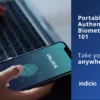In just a year, the Indicio Network has grown into the leading platform for enterprise-grade decentralized products and services—and a community of ground-breaking companies in decentralized and Web3 identity products and services
What a year.
Last January, we launched the Indicio MainNet, the keystone of the Indicio Network, a global platform designed to support mission critical uses of decentralized identity built on the open-source Hyperledger Indy code base.
The MainNet joined its older TestNet sibling, launched in 2020, and — in the summer of 2021 — both were joined by the DemoNet.
Together, they enabled companies to build and test their products (TestNet), demonstrate their products in a safe environment (DemoNet), and then deploy their products in a global marketplace with the assurance that they were backed by a robust, professionally staffed, global MainNet.
That assurance is critical. We know how long it takes to test and demo products. We know what enterprises need to create and sell products. We saw the need, we heard, repeatedly, from our earliest clients that’s what they needed; and so we made it a reality.
Now, in January 2022, our growing global network of nodes is supported by twenty-six diverse companies on five continents. Each is an innovator. All are committed to building a better way to manage digital identity and to create the trust in data needed for the machine, spatial, and Web3 age. Indicio is a global network for a technology that brings value to everyone.
What makes the Indicio Network the best network for decentralized identity solutions?
Decentralized identity networks are often likened to utilities for identity, so what do people, typically, want from utilities? Dependability, affordability, and simplicity
Dependability. There can’t be outages. If technical problems occur, they need to be fixed fast. The Indicio Network meets these challenges, first by scale. Each node on the network supports a copy of the ledger, so unlike Facebook going down, there are 26 other Facebooks to make sure your product, company, or organization isn’t in the dark.
Second, our network is staffed and monitored by experts using state-of-the-art monitoring tools. This may sound obvious—surely every network has this? But it isn’t and they don’t. We as a company build solutions on the Indicio Network. We have skin in the network working dependably. We need it to be the best functioning utility for identity out there. This means our staff are your staff in this endeavor. We’re here for you — all the time. Your success is our success.
Affordability. Writes to the ledger are one way to monetize decentralized identity. We believe in making fees for writing to our ledger simple, cost effective, and predictable. We also believe that these fees should not be an obstacle to implementing the right architecture for a solution. No decentralized identity system should cut corners to save money or from fear of unexpected future costs. We see affordability driving reliability, and reliability driving and sustaining adoption.
Simplicity. It’s no secret that decentralized identity can be tough to understand if you’re delving into it for the first time (and especially if you’re not an engineer). We get it! We want to make everything about decentralized identity as simple as possible, from onboarding a node to providing wizards to simplify technical processes and enabling machine-readable governance.
Still too complicated? We will host and run a node for you.
We also have the largest range of hands-on training workshops for all aspects of decentralized identity—and we were chosen by Hyperledger to develop and run technical training programs.
This is what we built in 2021—and it’s amazing to look back at the year and all we — and our node operators — achieved. But it was even more exciting to see what people began building and releasing on this foundation, projects such as the Aruba Health Pass, LAVCE, and Passmate.
As we move toward a more trustworthy digital world, 2022 is going to be one long, energetic build-athon. And if that excites you, we should talk.






